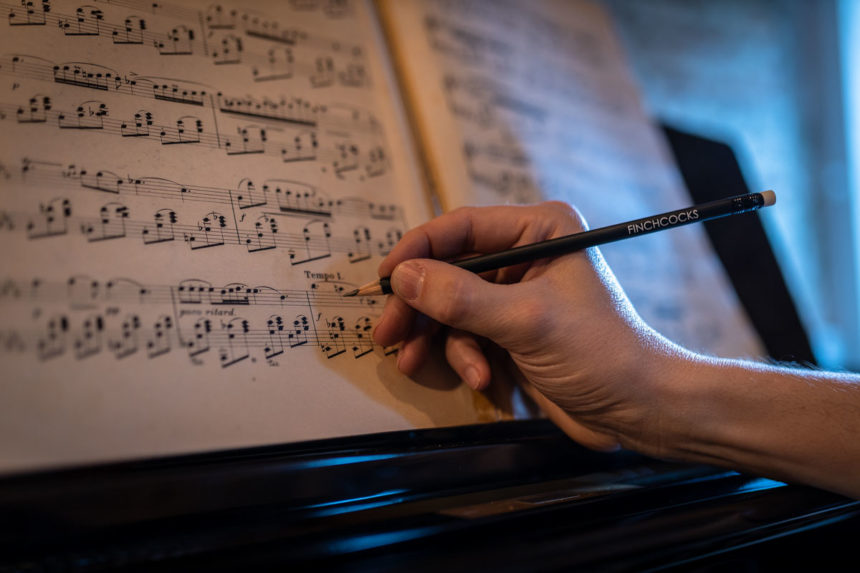How do you practise? : A question many an instrumental and singing teacher asks their students. The reaction is often one of awkward tumbleweed, or dazed confusion. (If the student knows, that is, that the answer should be something other than “Well, I play it through a few times.”!)

It’s not a surprise how often we as musicians slip into the trap of playing for enjoyment, expecting improvement. We play music because we love it after all!

But, if you imagine practice akin to weeding the garden, walking across the lawn won’t get rid of the dandelions. You need to approach practice as you would weeding; directed, focussed and precise. A good lawn is tended regularly!
Here are some practice ideas, picked up along my journey as a musician, teacher and from courses here at Finchcocks:
Prepare your body
- Jog on the spot to get your energy up.
- Release tension with some stretches. Yoga and Pilates can provide some great inspiration for this. Makes sure you stretch out arms, shoulders and neck well.
- Adjust the piano stool to a comfortable height.
Prepare your mind before you practice
- Lose all distractions. Turn off your mobile phone and ask those nearby not to bother you.
- Mindfulness techniques are great to prepare the mind. Concentrate on your breathing as you notice the sounds around you, the sensation of sitting at the piano and then purely your breathing for a minute before you begin playing.

Plan your practice
- Plan out what you want to achieve that week and break it down to smaller practice sessions. Tick goals off when you achieve them!
- Work out your optimum practice time, rather than playing for the amount of time you have. Some recommend 40 minutes as the best amount of time for practice. I prefer the pomodoro technique of 25 minutes followed by a 5 minute break. This can applied to anything. If you have the time, repeat the process 4 times, and then take a more significant break.
- Little and often provides the most productive form of practice. It’s easier to concentrate, fit into daily life and is more effective at consolidating previous work.
Be methodical
- Study your piece: Listen to a recording whilst studying the score. Look for patterns and harmonic structure.
- Hands separately: The age old chestnut of hands separately, then together.
- 3 times perfect: Practise a bar or passage until you can play it 3 times perfectly, in a row! Don’t allow yourself to move on until you can do it.
- Back to front! This is one of Dave Hall‘s favourites: Practise the last bar. When perfect, go back one and play the second to last bar. When this is perfect, play the last two bars together. Play the third to last bar. When this is perfect, play the last three bars together… and so on! By the time you get to the beginning of the piece, you’ll be able to play right the way through.
- Quarantine: Graham Fitch‘s invention! Mark a tricky bar in brackets. Put it in “quarantine” and don’t release it until it’s better.
- Getting up to speed: begin at the speed you can play the whole piece perfectly, even the tricky passages. Increase the metronome marking by 2MM each time.

Get singing
- Sing a phrase then play it.
- Sing and play a phrase simultaneously.
- Alternate between singing and playing e.g. Sing bars 1 and 3, play bars 2 and 4.
- Sing one hand whilst playing with other hand.
- Sing the phrase in your head (with your “thinking voice”) whilst playing.
And a few more tips…
- No pedals: Practise without the softening blur of the sustain pedal.
- Dynamics: Learn new music with the dynamics from the start.
- Mix it up! A favoured idea for scales and runs is to change the rhythm. Play a string of even notes dotted or dotted notes even. Play a heavy passage lightly or a staccato one legato. Try a slow passage fast. Give the phrase a different mood or character. Play it “shyly”, “aggressively” or like it’s the best joke you’ve heard in years!
- Memorise a tricky passage. The effort will pay off.
- Record yourself. Listen back and tackle those passages you hadn’t picked up on.
- Celebrate your successes: It’s very easy to become frustrated when we spot our mistakes. Look back at where you were the previous week, or even at the beginning of your practice, and give yourself a pat on the back!

Now for me to follow my own advice and tackle those phrases I always hope will magically get better. If anyone needs me, I’ll be practising…
Jennifer Maslin is a vocal and instrumental tutor based in Tunbridge Wells, and Assistant Course Director at Finchcocks. She specialises in classical and jazz singing and has a strong interest in continued professional development, keeping her own singing and helping her students’ singing be the best it can be.

